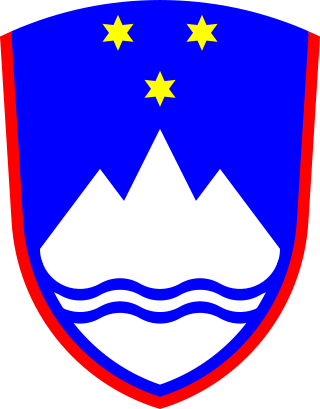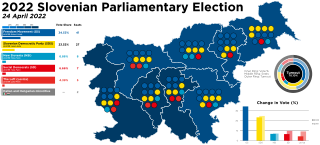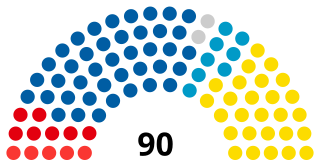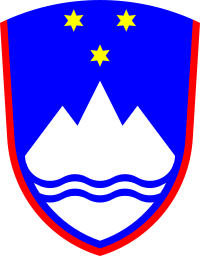
The politics of Azerbaijan take place in an authoritarian system where elections are not free and fair, political opponents are repressed, civil rights are limited, human rights abuses are widespread, corruption is rampant, and power is concentrated in the hands of President Ilham Aliyev and his extended family.

Borut Pahor is a Slovenian politician who served as President of Slovenia from 2012 to 2022. He previously served as Prime Minister of Slovenia from 2008 to 2012.
Same-sex marriage has been legal in Slovenia since 9 July 2022 in accordance with a ruling from the Constitutional Court of Slovenia. The court ruled that the ban on same-sex marriages violated the Constitution of Slovenia and gave the Parliament six months to amend the law to align with the ruling, although the decision took effect immediately after publication. The National Assembly passed legislation to align with the court ruling on 4 October 2022, which was vetoed by the National Council one week later, but the veto was then overridden by the National Assembly on 18 October 2022.

Lesbian, gay, bisexual, and transgender (LGBT) rights in Slovenia have significantly evolved over time, and are considered among the most advanced of the former communist countries. Slovenia was the first post-communist country to have legalised same-sex marriage, and anti-discrimination laws regarding sexual orientation and gender identity have existed nationwide since 2016.

The Constitutional Court of Slovenia is a special court established by the Slovenian Constitution. Since its inception, the Court has been located in the city of Ljubljana. It is the highest court in the country for reviewing the constitutionality and protection of human rights and fundamental freedoms, otherwise the highest court in the country is the Supreme Court of the Republic of Slovenia. The constitutional court is not part of any branch of government and is an independent state body.

Gregor Virant is a Slovenian politician and public servant. Between 2004 and 2008, he served as Minister of Public Administration in Janez Janša's first government, between 2011–2013 he was Speaker of the National Assembly of Slovenia. He also served as Minister of the Interior and Public Administration in the government of Alenka Bratušek between 2013 and 2014.

The president of the National Assembly of Serbia is the presiding officer of the National Assembly of Serbia. The president is elected by members of each new assembly for a term lasting four years.
The Government of the Republic of Slovenia exercises executive authority in Slovenia pursuant to the Constitution and the laws of Slovenia. It is also the highest administrative authority in Slovenia.

Parliamentary elections were held in Slovenia on 4 December 2011 to elect the 90 deputies of the National Assembly. This was the first early election in Slovenia's history. The election was surprisingly won by the center-left Positive Slovenia party, led by Zoran Janković. However, he failed to be elected as the new Prime Minister in the National Assembly, and the new government was instead formed by a right-leaning coalition of five parties, led by Janez Janša, the president of the second-placed Slovenian Democratic Party. The voter turnout was 65.60%.

Parliamentary elections were held in Slovenia on 3 June 2018. The elections were originally expected to be held later in June 2018, but after the resignation of Prime Minister Miro Cerar on 14 March 2018 all parties called for snap elections. They were the third consecutive snap elections after 2011 and 2014.

Presidential elections were held in Slovenia on 22 October 2017. Nine candidates ran in the first round of the elections, in which the incumbent independent President Borut Pahor placed first and Marjan Šarec of the List of Marjan Šarec (LMŠ) placed second. No candidate received a majority of the vote in the first round, resulting in a run-off between Pahor and that was held on 12 November 2017. Pahor won the run-off with 53% of the vote; voter turnout in the second round was 42.13%, the lowest in any presidential election since independence.

Luka Mesec is a Slovenian politician and activist who has been the leader of the eco-socialist The Left party since June 2017. Mesec was elected to the Slovenian National Assembly for the first time at the 2014 parliamentary election, and reelected at the 2018 parliamentary election. He is the coordinator of the Council of the Initiative for Democratic Socialism, Labour-Punk University, and its successor, the Institute for Labour Studies.

The 8th National Assembly of the Republic of Slovenia was elected in the 3 June 2018 Slovenian parliamentary elections. At the order of President Borut Pahor, it first convened on 22 June 2018. The assembly was in session during the outgoing 12th Government of Prime Minister Miro Cerar and elected the 13th and 14th governments. It was the fourth consecutive time in which centre-left and left-wing parties had a majority.
This is a list of appointments by the 8th National Assembly:

Parliamentary elections were held in Slovenia on 24 April 2022 to elect all 90 members of the National Assembly.
The 14th Government of Slovenia was formed following the resignation of Prime Minister of the 13th Government Marjan Šarec in January 2020. Janez Janša of Slovenian Democratic Party formed a coalition with Modern Centre Party, New Slovenia, and Democratic Party of Pensioners of Slovenia. The government was confirmed on 13 March 2020, amidst the COVID-19 pandemic.

Igor Zorčič is a Slovenian politician who has been Speaker of the National Assembly of Slovenia since 2020.

The 9th National Assembly of the Republic of Slovenia was elected during the presidency of Borut Pahor. It was elected during the legislative election held on 24 April 2022.














